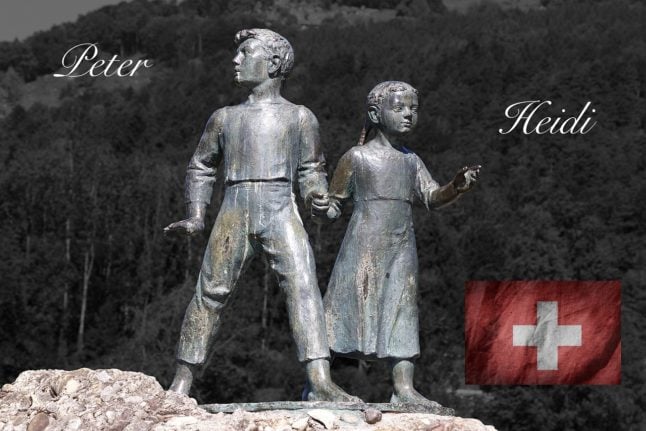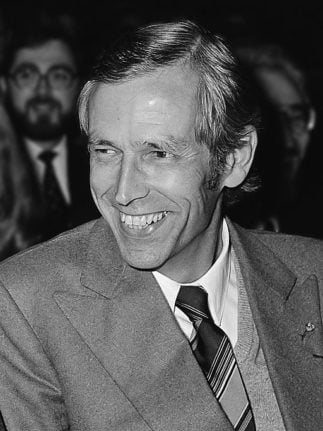10 Swiss people who have changed the world

Switzerland may be a small country, but throughout history, many of its citizens have been true trailblazers, whose accomplishments were (and are) ground-breaking on a global scale.
The world ‘pioneer’ is not used very often when talking about Switzerland or its population.
But you may be surprised to learn that quite a few Swiss citizens have reached the heights — not of the Alps, as you may logically assume — but in a much broader sense.
Some of them are well known, while others less so, but their achievements in their respective fields have influenced, inspired, and often even shaped the world we live in.
So let’s have a look at who those movers and shakers are.
Leonhard Euler
Unless you are a hardcore science buff, you may not have heard about this 18th-century Swiss mathematician, physicist, astronomer, geographer, logician and engineer.
However, the Basel native made significant contributions to a wide range of fields, including analytic geometry, trigonometry, geometry, calculus, and number theory.
He is best known for solving, at age 28, a mathematical problem that had stumped much older scientists of his era: an analysis relating to number theory, concerning an infinite sum of inverse squares, which has since become known as ‘The Basel problem.’
Henry Dunant
When a Geneva doctor witnessed the devastation and human suffering on both sides of the Battle of Solferino in 1859, especially the lack of medical care for the wounded soldiers, he decided to do something about it.
What he ultimately did changed the world.
When he returned to Geneva, Dunant founded, in 1863, the Red Cross which, though its name had eventually been expanded to 'the International Committee of the Red Cross and Crescent,' is still headquartered in his native city and active to this day.
His humanitarian efforts earned Dunant the first-ever Nobel Prize for Peace in 1901.

A flag of the International Committee of the Red Cross still flutters over Geneva. Photo by Fabrice COFFRINI / AFP
Albert Einstein
Some may argue that Einstein, arguably the greatest physicist that ever lived, was German, not Swiss.
It is true that he was born in Ulm, Germany, but he did become a Swiss citizen in 1901, and had lived in both Bern and Zurich during his seven-year residency in Switzerland.
In fact, it was while working at the federal patent office in Bern, that he developed his ground-breaking theory of relativity.
And the rest, as they say, is history.
Johanna Spyri
Even if you have not heard about this 19th-century novelist, you surely know her most famous creation, Heidi the mountain girl.
This fictional character has conquered the entire world, figuratively speaking of course.
There is hardly a country where Heidi is not known as a young girl who lives in the Swiss Alps with her grandfather, friend Peter, and a herd of goats.

A monument to Spyri's heroes: Heidi and Peter. Photo: Pixabay
Carl Jung
The Swiss psychiatrist made significant contributions to the world of psychotherapy.
His best known accomplishment in the field was developing the so-called ‘analytical therapy’, intended to help people better understand their unconscious mind.
Jacques Piccard
Paradoxically, the first man to reach the deepest point in the ocean was born in land-locked Switzerland.
However, that did not stop Piccard from diving, in 1960, to the bottom of the Marianas Trench in the western Pacific Ocean – 10,916 metres beneath the surface.
While this is undoubtedly quite a feat, Piccard contributed to making the word a better place in other ways as well: he was a staunch supporter of protecting the oceans and the environment in general, and one of the earliest ecologists to draw the international attention to the problems of pollution and exhaustion of natural resources.

Jacques Piccard in 1979. Photo: Wikimedia Commons
Bertrand Piccard, Jacques’ son
Love for adventure passed from Jacques to his son Bertrand.
Though he is a psychiatrist by training, the younger Piccard is also the first man to complete, in 1999, a non-stop balloon flight around the globe.
He and his co-pilot Brian Jones flew nearly 46,000 km from the Swiss Alps to Egypt, in a span of 19 days, 21 hours, and 47 minutes.
Elisabeth Kübler-Ross
The Zurich-born psychiatrist was a pioneer in near-death studies.
Her bestseller 1969 book, On Death and Dying, launched the concept of “Five Stages of Grief — denial, anger, bargaining, depression, and acceptance — that have since become widely accepted as phases the bereaved people go through.
Charles-Édouard Jeanneret
Better known as Le Corbusier, Jeanneret was the pioneer of modern architecture.
His wide body of work spans the world and includes the United Nations Headquarters in New York, Villa Savoye in Poissy (France), La Roche-Jeanneret Project in Paris, Assembly and Justice Palaces in Chandigarh(India), in addition to dozens more, including 17 that are UNESCO World Heritage sites.

The Palace of Assembly in Chandigarh, designed by Le Corbusier. Photo by Money SHARMA / AFP
Roger Federer
You didn’t think we would omit HIM, did you?
You could say Federer was merely a sports figure, but for many people in Switzerland and elsewhere he was much more than that.
Aside from inspiring countless budding tennis players with his hard work, discipline, and perseverance, he continues to channel some of the money he earned into worthwhile causes.
His namesake foundation helps children living in poverty "to take control of their future and actively shape it. There is sufficient evidence that proves that education is a prerequisite for reducing poverty, improving preventive healthcare and creating a committed civil society".
READ MORE: 'Thanks for everything, champ': What Roger Federer means to Switzerland
Comments
See Also
The world ‘pioneer’ is not used very often when talking about Switzerland or its population.
But you may be surprised to learn that quite a few Swiss citizens have reached the heights — not of the Alps, as you may logically assume — but in a much broader sense.
Some of them are well known, while others less so, but their achievements in their respective fields have influenced, inspired, and often even shaped the world we live in.
So let’s have a look at who those movers and shakers are.
Leonhard Euler
Unless you are a hardcore science buff, you may not have heard about this 18th-century Swiss mathematician, physicist, astronomer, geographer, logician and engineer.
However, the Basel native made significant contributions to a wide range of fields, including analytic geometry, trigonometry, geometry, calculus, and number theory.
He is best known for solving, at age 28, a mathematical problem that had stumped much older scientists of his era: an analysis relating to number theory, concerning an infinite sum of inverse squares, which has since become known as ‘The Basel problem.’
Henry Dunant
When a Geneva doctor witnessed the devastation and human suffering on both sides of the Battle of Solferino in 1859, especially the lack of medical care for the wounded soldiers, he decided to do something about it.
What he ultimately did changed the world.
When he returned to Geneva, Dunant founded, in 1863, the Red Cross which, though its name had eventually been expanded to 'the International Committee of the Red Cross and Crescent,' is still headquartered in his native city and active to this day.
His humanitarian efforts earned Dunant the first-ever Nobel Prize for Peace in 1901.

Albert Einstein
Some may argue that Einstein, arguably the greatest physicist that ever lived, was German, not Swiss.
It is true that he was born in Ulm, Germany, but he did become a Swiss citizen in 1901, and had lived in both Bern and Zurich during his seven-year residency in Switzerland.
In fact, it was while working at the federal patent office in Bern, that he developed his ground-breaking theory of relativity.
And the rest, as they say, is history.
Johanna Spyri
Even if you have not heard about this 19th-century novelist, you surely know her most famous creation, Heidi the mountain girl.
This fictional character has conquered the entire world, figuratively speaking of course.
There is hardly a country where Heidi is not known as a young girl who lives in the Swiss Alps with her grandfather, friend Peter, and a herd of goats.

A monument to Spyri's heroes: Heidi and Peter. Photo: Pixabay
Carl Jung
The Swiss psychiatrist made significant contributions to the world of psychotherapy.
His best known accomplishment in the field was developing the so-called ‘analytical therapy’, intended to help people better understand their unconscious mind.
Jacques Piccard
Paradoxically, the first man to reach the deepest point in the ocean was born in land-locked Switzerland.
However, that did not stop Piccard from diving, in 1960, to the bottom of the Marianas Trench in the western Pacific Ocean – 10,916 metres beneath the surface.
While this is undoubtedly quite a feat, Piccard contributed to making the word a better place in other ways as well: he was a staunch supporter of protecting the oceans and the environment in general, and one of the earliest ecologists to draw the international attention to the problems of pollution and exhaustion of natural resources.

Bertrand Piccard, Jacques’ son
Love for adventure passed from Jacques to his son Bertrand.
Though he is a psychiatrist by training, the younger Piccard is also the first man to complete, in 1999, a non-stop balloon flight around the globe.
He and his co-pilot Brian Jones flew nearly 46,000 km from the Swiss Alps to Egypt, in a span of 19 days, 21 hours, and 47 minutes.
Elisabeth Kübler-Ross
The Zurich-born psychiatrist was a pioneer in near-death studies.
Her bestseller 1969 book, On Death and Dying, launched the concept of “Five Stages of Grief — denial, anger, bargaining, depression, and acceptance — that have since become widely accepted as phases the bereaved people go through.
Charles-Édouard Jeanneret
Better known as Le Corbusier, Jeanneret was the pioneer of modern architecture.
His wide body of work spans the world and includes the United Nations Headquarters in New York, Villa Savoye in Poissy (France), La Roche-Jeanneret Project in Paris, Assembly and Justice Palaces in Chandigarh(India), in addition to dozens more, including 17 that are UNESCO World Heritage sites.

Roger Federer
You didn’t think we would omit HIM, did you?
You could say Federer was merely a sports figure, but for many people in Switzerland and elsewhere he was much more than that.
Aside from inspiring countless budding tennis players with his hard work, discipline, and perseverance, he continues to channel some of the money he earned into worthwhile causes.
His namesake foundation helps children living in poverty "to take control of their future and actively shape it. There is sufficient evidence that proves that education is a prerequisite for reducing poverty, improving preventive healthcare and creating a committed civil society".
READ MORE: 'Thanks for everything, champ': What Roger Federer means to Switzerland
Join the conversation in our comments section below. Share your own views and experience and if you have a question or suggestion for our journalists then email us at [email protected].
Please keep comments civil, constructive and on topic – and make sure to read our terms of use before getting involved.
Please log in here to leave a comment.